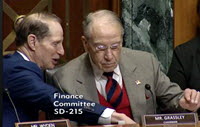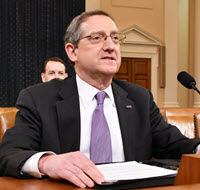A bipartisan group of Senate Finance Committee policymakers this week recommended the tax deduction for energy efficient commercial buildings (section 179D) should become a permanent provision in the federal tax code. Section 179D expired at the end of 2017. ( BloombergTax , Aug. 13)
 |
Senate Finance Chairman Chuck Grassley (R-IA), right, and Ranking Member Ron Wyden (D-OR), left, set up five bipartisan task forces in May to consider long-term solutions for more than 40 temporary provisions in the federal tax code that repeatedly expire and come up for renewal. |
- Senate Finance Chairman Chuck Grassley (R-IA) and Ranking Member Ron Wyden (D-OR) set up five bipartisan task forces in May to consider long-term solutions for more than 40 temporary provisions in the federal tax code that repeatedly expire and come up for renewal.
- Three of the task forces released reports on Wednesday, addressing the areas of cost recovery (e.g., sec. 179D) and energy (e.g., sec. 45L credit for energy-efficient new homes). In addition to recommending permanency for section 179D, the Cost Recovery Temporary Tax Policy Task Force led by Senators Mike Crapo (R-ID) and Ben Cardin (D-MD) noted that further improvements to the provision would accelerate its positive impact.
- The reports refer to extensive comments from stakeholders, including The Real Estate Roundtable and industry coalitions. The committee also posted further information about the temporary tax policies that the task forces examined.
- The task forces' "thorough and bipartisan approach will form the foundation of the committee's work to provide more certainty to temporary tax policy," Grassley said. "The next step will be to put together a legislative package based on the proposals that the taskforces received, the areas of consensus among the taskforce members and continued bipartisan discussions." (SFC news release, Aug. 13)
- In the House, the Ways and Means Committee on June 20 passed legislation to extend a host of expired and expiring tax credits through 2020, including section 179D. (Markup of House Tax Legislation and Roundtable Weekly, June 21) The Taxpayer Certainty and Disaster Tax Relief Act of 2019 (H.R. 3301) includes other provisions affecting real estate:
• Credit for construction of new energy efficient homes (sec. 45L)
• Credit for energy efficient improvements to existing homes (sec. 25C)
• Exclusion of mortgage debt forgiveness (sec. 108(a)(1)(E))
• Deductibility of mortgage insurance premiums (sec. 163(h)(3)(E))
• New markets tax credit (sec. 45D)
• Empowerment zone tax incentives (sec. 1391-97)
 |
Building Owners and Managers Association (BOMA) International President and Chief Operating Officer, Henry Chamberlain, testified before Ways and Means last year to support Section 179D's permanence. ( BOMA testimony -March 14, 2018) |
- Building Owners and Managers Association (BOMA) International President and Chief Operating Officer, Henry Chamberlain, testified before Ways and Means last year to support Section 179D's permanence. (BOMA testimony, March 14, 2018)
- On a separate track from extenders and 179D is an energy efficiency tax proposal urged by The Roundtable and a broad coalition of real estate and environmental organizations. The groups urge House and Senate tax writers to establish an accelerated depreciation schedule for a new category of Energy Efficient Qualified Improvement Property installed in buildings – or "E-QUIP" – with a 10-year cost recovery period (Coalition E-QUIP Letter, May 8)
- Roundtable President and CEO Jeffrey DeBoer stated, "The purpose of establishing a new E-QUIP category in the tax code is to stimulate productive, capital investment on a national level that modernizes our nation's building infrastructure while helping to lower greenhouse gas emissions." (Roundtable Weekly, May 10)
When Congress returns on September 9 from summer recess, additional changes to the Ways and Means extenders bill may be made as it moves to the House floor, and then to the Senate. However, passage of spending bills to fund the government beyond September 30 are considered must-pass legislation. Whether an extenders bill can be attached to an FY'20 appropriations bill is uncertain at this time.
# # #

